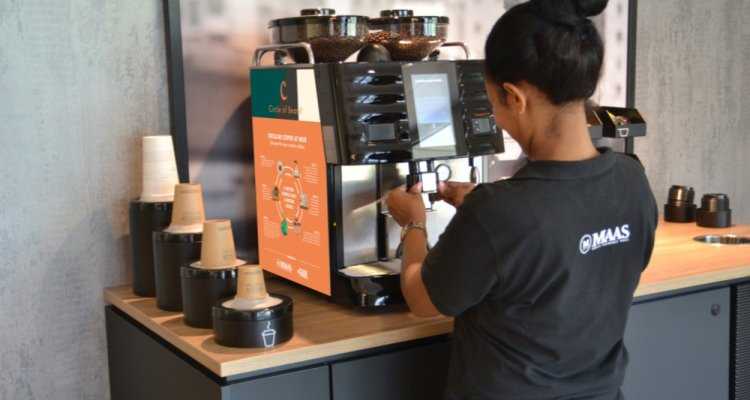WAGENINGEN, The Netherlands – The developments for greater sustainability at Wageningen University & Research (WUR) are ongoing. The next step this January is that WUR has switched to sustainable coffee, the Circle of Beans coffee. This is a step in the process towards circular coffee. Circular processes include reduction, reuse and recycling. After this sustainable coffee has been made there is no waste. The coffee grounds are being transferred to a raw material that can be used again and again.
The latest step in this process towards circular coffee has been taken by WUR’s Facilities & Services together with the suppliers MAAS and Fair Company. Fair Company owns the Circle of Beans brand, and WUR is the first MAAS customer where Circle of Beans coffee will be made available.
What are the steps in this circular coffee process at Wageningen University & Research?
The coffee grounds used to make a cup of coffee at WUR are first collected separately by supplier MAAS and then Fair Company collects them from MAAS. The coffee grounds are put into a reactor at Fair Company’s coffee roasting plant in Ede. In the reactor specially cultivated bacteria convert the coffee grounds into biogas. The biogas is then used to roast the green coffee beans of Circle of Beans coffee. Finally, the roasted and packaged coffee is used in the WUR (MAAS) coffee machines so that coffee lovers can enjoy a cup of sustainable coffee.
What is so sustainable about this coffee?
No fossil fuels are used in the manufacturing process of Circle of Beans coffee. Circle of Beans is the only coffee roasting plant in the world that produces its own gas from coffee grounds and is not connected to the gas grid. They substitute biogas for natural gas. In addition, the coffee carries the Rainforest Alliance certification. The Rainforest Alliance certification guarantees the demonstrable and measurable traceability of the coffee. This Alliance focuses on the labour conditions of farmers and employees, the environment and the preservation of the natural biological diversity in rain forests. Rainforest Alliance has already prevented the loss of about 4.4 million hectares of rain forest in risk areas.
The coffee waste is also used sustainably. About 6 kg of coffee grounds are needed to roast 25 kg of coffee (per batch/time). MAAS also pays attention to the other waste streams in a coffee machine, such as the water used to prepare coffee or tea. For every cup of coffee, tea or water prepared in one of the (MAAS) machines at WUR, the cost of a litre of clean drinking water is donated to developing countries via Made Blue. Made Blue facilitates clean drinking water in these developing countries by digging wells and installing filter systems and pipelines to transport clean drinking water from the mountains to the villages below.
And…how does this coffee taste?
The taste of the coffee beans is the same as before. The process still uses the same premium Arabica coffee beans from the South American highlands.















